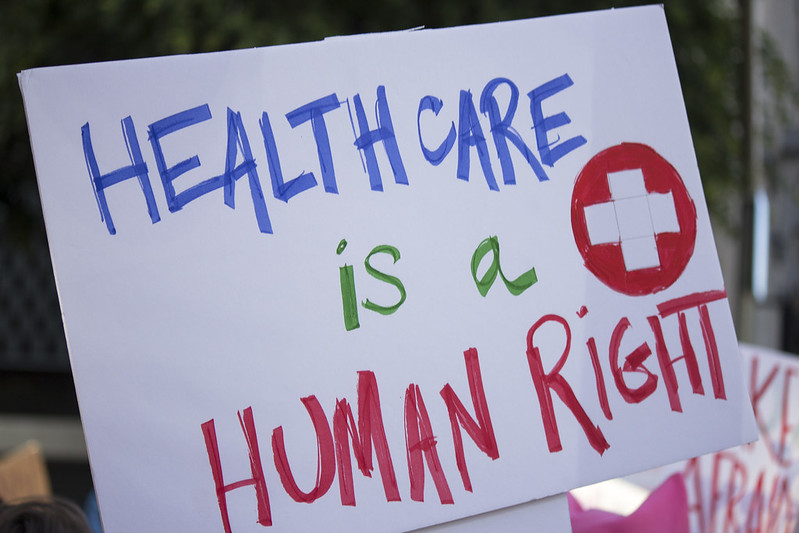Abortion may be legal in Australia, but many women cannot count on accessing it
Melissa Lewis, 32, knew from “the second I found out I was pregnant”, that she would be getting an abortion. Already a mother of three children, the youngest only recently turning one, and on contraception, the pregnancy was a surprise. The decision to get an abortion was a “a very easy, no brainer decision”.
Accessing an abortion, however, was not as easy.
Like many women living in regional areas, Melissa struggled to find abortion services. With online searches yielding little to no results, the best she could find in her area, the Goulburn Valley, were services which provided advice but none that actually provided terminations.
“Abortion access is often determined by postcode lottery,” says Dr Erica Millar, a senior research fellow at La Trobe University.
According to Dr Millar, the reason for the drought of reginal abortion services is the shift towards the privatisation of abortion in Victoria.
The liberalisation of abortion laws in Victoria, did not adequately ensure access to abortion services through public hospitals, says Dr Millar. As private healthcare clinics need to be profitable, there is little incentive to operate in regional areas that have only a scattered population. Compounding the lack of access is that fact that there is no guarantee that a regional public hospital will provide abortion services.
Having learned that she was pregnant at four weeks, Melissa was acutely aware that her window for having a medical abortion was closing fast. The cut-off period for medical abortions (which involve taking a pair of oral medications, mifepristone and misoprostol) is nine weeks—or 63 days.
“The weight I felt on my shoulders during that time was immense. I was concrete in my decision, so the possibility of not getting a medical termination within the 63 day was incredibly worrying,” she says.
Melissa tried getting through to the organisation Marie Stopes, who she knew provided abortions through telehealth, but at the exact time she needed their services, they were inundated. “When I contacted Marie Stopes and was told that they were overwhelmed with enquiries and I had to wait for a call back, I instantly went into a panic. I was on Google constantly.”
Melissa knew that if she could not find an abortion provider quickly, she would have to make a 200 kilometre trip to Melbourne.
“There are still significant gaps in parts of regional Victoria where medical abortion is not available within a couple of hundred kilometres,” says Carolyn Mogharbel, the manager of Victoria’s 1800MyOptions Services, a confidential and free phone and online service of Women’s Health Victoria which helps women co-ordinate health care issues such as abortion. “A really sad reality is that women have to travel significant distance for a time sensitive, essential service.”
Eventually, Melissa managed to find a telehealth service which provided her with a medical abortion. By the time she had picked up mifepristone and misoprostol, from a pharmacist registered to issue the medications, she was at the eight week mark of her pregnancy.
Dr Kathleen McNamee, a doctor at Sexual Health Victoria, says that for many women, a medical abortion is preferable the surgical alternative because of the ability to take the medication in the privacy and comfort of their own home. Many also feel it is more natural and less invasive than a surgical abortion.
“I think being able to do something so personal in the privacy of your own home is comforting,” says Melissa, explaining that despite her difficulties in trying to find a service provider for medical abortions, it remained the most accessible option for her.
As mifepristone and misoprostol can be prescribed by a GP, medical abortions also have the benefit of filling in the gap left by public hospitals and private health care clinics across regional areas.
Since mifepristone and misoprostol were added to the Pharmaceutical Benefits Scheme in 2013, the frequency of medical abortions has risen.
“Medical abortion is the biggest hope when it comes to access in rural areas,” says Dr Millar.
However, the vast majority of GPs in Australia are not registered to prescribe medical abortions.
The Therapeutic Goods Administration (TGA) requires GPs to go through additional training and must then register to become a prescriber of the drugs. Pharmacists are also required to register to prescribe the drugs.
No other drugs in Australia are subject to such additional regulation.
“Because it requires proactive actions, there has been a slow uptake by GPs,” says Dr Millar.
According to SPHERE, a coalition of organisations and groups seeking to secure high-quality sexual and reproductive health services for women across Australia, there are currently 703 out of 34,000 practicing GPs who are registered the provide medical abortions.
Shelly Makleff, a research fellow at Global and Women’s Health at Monash University and an affiliate of the SPHERE Coalition, says that the consequences of such limited GP uptake are experienced disproportionately by those already most vulnerable. “The people who are already facing the most difficult times in having access to healthcare in general will suffer the most when there are further barriers to care,” she says.
According to Dr Millar, there is no medical or safety reason why mifepristone and misoprostol should be subject to additional restrictions.
The World Health Organisation lists mifepristone and misoprostol on the WHO Model List of Essential Medicines, and studies have shown that medical abortions are 95 percent effective.
“It is part of an overregulation—that abortion is more dangerous than it is and that it needs to be regulated differently to other types of treatment. Abortion is very safe,” says Dr Millar.
She says that the TGA needs to remove the additional barriers—and that such removal would improve access to abortions not only in regional Victoria, but across the country. It is a move that SPHERE is also advocating for.
For her part, Melissa, “would love for doctors in the area and other regional areas to see stories like this and become a provider for medical termination. Hopefully, one day it’s a reality.”
If you need abortion or sexual health and contraceptive services, contact:
- 1800 MyOptions on 1800 696 784
- Sexual Health Victoria on 1800 013 952
- Marie Stopes on 1300 863 549
Featured image: Women’s March Los Angeles, 2017, Larissa Puro via Flickr






